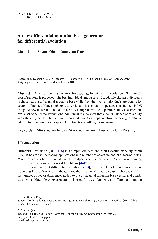摘要
A new differential mutation base strategy for differential evolution (DE), namely best of random, is proposed. The best individual among several randomly chosen individuals is chosen as the differential mutation base while the other worse individuals are donors for vector differences. Hence both good diversity and fast evolution speed can be obtained in DE using the new differential mutation base. A comprehensive comparative study is carried out over a set of benchmark functions. Numerical results show that a better balance of reliability and efficiency can be obtained in differential evolution implementing the new generator of differential mutation base, especially in functions with high dimension.
- 出版日期2011-1
- 单位西南交通大学
